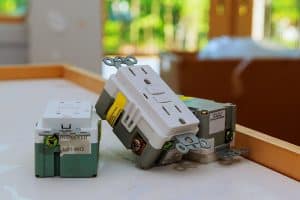 A ground fault circuit interrupter or GFCI outlet is there to protect you against electrical shock. When you install these outlets, you are providing yourself with an inexpensive solution that helps to prevent you from being shocked, and it can bring your home up to modern building standards.
A ground fault circuit interrupter or GFCI outlet is there to protect you against electrical shock. When you install these outlets, you are providing yourself with an inexpensive solution that helps to prevent you from being shocked, and it can bring your home up to modern building standards.
Do I need a GFCI outlet?
These GFCI outlets are needed in places like garages, bathrooms, and kitchens, where there is a risk of electrical shock. These outlets can be seen by the reset and test buttons located on the outlet. These outlets will keep you from electrical hazards because they monitor how much electricity flows in a circuit. The moment that there is an imbalance, then the GFCI outlet will cut the power off.
If your outlet stops the power under normal conditions, then press on the reset button to restore the power. These outlets are very reliable than depending on a circuit breaker to stop the flow of the current as they are more sensitive to any current variations. They are designed to cut the power off before an electrical shock can affect your heart. It is best that you test these outlets each month as a safety check.
How to test the GFCI outlet
- Press the Test button
- Plug in a small device that doesn’t use much electricity to make sure that the current has stopped
- Press reset to return power
Where are these outlets required?
The GFCI outlets have been required to be in your home since 1971, whenever they were stated to be used for any swimming pool equipment and along with any areas that surrounded the pool. Now, there are many areas of your home where a GFCI outlet is required, especially where there is a risk of electrical shock because of risk factors due to exposure like water.
Where to Install GFCI Outlets:
- Utility sinks and laundry rooms
- Wet bars
- Unfinished basements and crawlspaces
- Kitchen countertops
- Garages
- Bathrooms
- Home exterior
- Pool and spa areas
GFCI Outlet Limitations
You should know that GFCI outlets do not need to be used for freezers or refrigerators. These appliances can cause electromagnetic interference, which will cause constant tripping of the GFCI outlet. Many dryers and stoves will require a 240-amp outlet for power, and that means that they are not compatible with a GFCI outlet. Some small appliances have heating elements like toaster ovens, hairdryers, and irons that may trip these outlets. Also, plugging too many devices into a single extension core can trip your GFCI outlet that the extension cord happens to be plugged into.
Upgrading to GFCI
Most older homes do not have GFCI outlets, and this is something that is putting you at risk for electrical shock. Do not wait to install these potentially life-saving and inexpensive outlets. Call Professional Electric today to install GFCI outlets in your home.